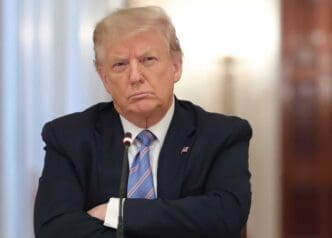Executive Summary
The Story So Far
Why This Matters
Who Thinks What?
Donald Trump has repeatedly made a series of claims that have been widely debunked by fact-checkers, with at least ten such assertions recurring in his public remarks over the past week. These claims span various topics, including economic figures, election integrity, and international relations, continuing a pattern of statements that have been previously disproven.
For years, President Trump’s public statements have been noted for their assertiveness, often featuring claims that are quickly challenged. This approach has contributed to consistently low poll results regarding his honesty and trustworthiness among the public. Despite numerous debunkings, he frequently reiterates these claims, a strategy that some observers suggest allows them to gain traction as news outlets naturally prioritize new information over repeated falsehoods.
Economic Claims
Gasoline Prices
President Trump claimed at a Cabinet meeting that gasoline prices had dropped below $2 per gallon in some Southern locations, with some places even breaking the $2 mark. However, data from AAA showed no state average below $2.69 per gallon, and GasBuddy reported no stations selling gas for $2 or less among the tens of thousands it tracks nationwide, excluding special discounts. The national average on Tuesday was $3.19 per gallon.
Prescription Drug Prices
Trump asserted that his administration had cut prescription drug prices by “1,200, 1,300, 1,400, 1,500%.” Fact-checkers, including CNN, have pointed out that these figures are not only inaccurate but also mathematically nonsensical, as a 100% price cut would make drugs free, and a cut exceeding that would imply consumers are paid to purchase medication. Trump has continued to use these figures in subsequent remarks.
Inflation Figures
Donald Trump repeatedly stated that “there’s no inflation” in the United States. Contrary to this claim, official data indicates that prices were 2.7% higher in July compared to a year prior and had increased by 0.2% from June. While the severity of these figures can be debated, the existence of inflation is not disputed by economic data.
Voting and Governance Claims
Mail-In Voting Uniqueness
To support his proposal to eliminate mail-in ballots, Trump revived his assertion that the United States is the only country in the world that uses mail-in voting. This claim has been repeatedly debunked, with numerous countries, including Canada, the United Kingdom, Germany, Australia, and Switzerland, employing mail-in ballot systems.
Los Angeles Water Supply
Trump recounted a story claiming he “turned the valve” to send water to Los Angeles, preventing it from flowing into the Pacific Ocean. Experts in California water policy have clarified that there is no single “valve” controlling statewide water flows. Additionally, the water released under his direction in early 2020 went to a different part of the Central Valley, over 100 miles north of Los Angeles, and did not reach the city.
2020 Election Integrity
Nearly five years after the 2020 election, Trump continues to claim it was “fraudulent” and “rigged,” referring to President Joe Biden’s victory as illegitimate. These assertions have been definitively disproven by extensive investigations and court rulings.
Monument Protection Legislation
Trump has repeatedly claimed he signed a law in 2020 imposing an automatic “10 years in prison” sentence for damaging monuments. This is inaccurate; he issued an executive order directing the Attorney General to prioritize investigations and prosecutions under existing federal laws, which allowed for a maximum sentence of 10 years, rather than creating a new automatic sentence.
Foreign Policy and Personal Anecdotes
Ukraine Aid Total
For months, Donald Trump has claimed the US provided “$350 billion” in wartime aid to Ukraine, an assertion he repeated multiple times at a recent event. Fact-checks have consistently shown this figure to be a significant exaggeration, with the actual amount being substantially smaller.
South Korea Cost-Sharing Agreement
Trump repeated a story alleging that South Korea had agreed to pay for the US military presence during his term, but President Biden subsequently ended this arrangement, costing the US billions. This claim reverses the reality; under President Biden, South Korea signed two cost-sharing agreements in 2021 and 2024, both of which included substantial increases in South Korean payments.
Maryland Governor’s Compliment
Trump claimed that Maryland Governor Wes Moore told him, “‘Sir, you’re the greatest president of my lifetime,'” during a conversation last year. This story was disproven by Fox News footage from a documentary, which recorded the conversation and showed that Governor Moore made no such statement. Trump later reiterated a similar version of the story, falsely claiming the camera had caught Moore in the act.
The repeated nature of these debunked claims highlights a consistent pattern in President Trump’s public statements, often persisting despite prior fact-checks and readily available evidence to the contrary. This steadfast adherence to previously disproven assertions continues to be a notable aspect of his political rhetoric.








